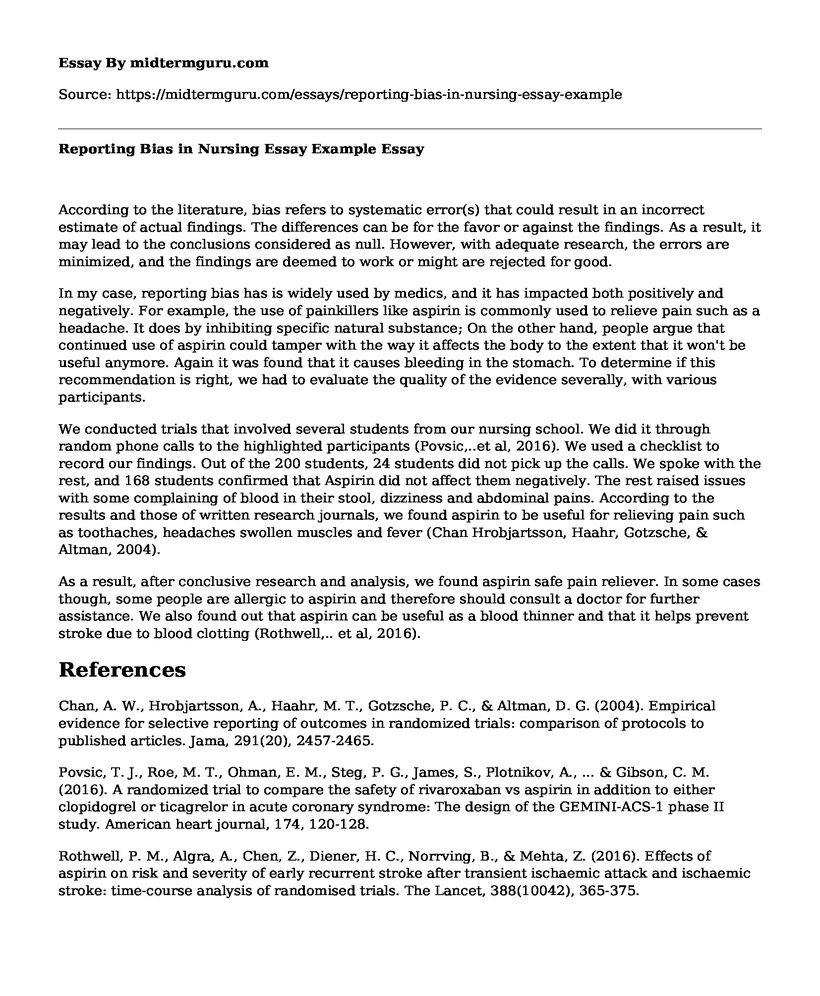According to the literature, bias refers to systematic error(s) that could result in an incorrect estimate of actual findings. The differences can be for the favor or against the findings. As a result, it may lead to the conclusions considered as null. However, with adequate research, the errors are minimized, and the findings are deemed to work or might are rejected for good.
In my case, reporting bias has is widely used by medics, and it has impacted both positively and negatively. For example, the use of painkillers like aspirin is commonly used to relieve pain such as a headache. It does by inhibiting specific natural substance; On the other hand, people argue that continued use of aspirin could tamper with the way it affects the body to the extent that it won't be useful anymore. Again it was found that it causes bleeding in the stomach. To determine if this recommendation is right, we had to evaluate the quality of the evidence severally, with various participants.
We conducted trials that involved several students from our nursing school. We did it through random phone calls to the highlighted participants (Povsic,..et al, 2016). We used a checklist to record our findings. Out of the 200 students, 24 students did not pick up the calls. We spoke with the rest, and 168 students confirmed that Aspirin did not affect them negatively. The rest raised issues with some complaining of blood in their stool, dizziness and abdominal pains. According to the results and those of written research journals, we found aspirin to be useful for relieving pain such as toothaches, headaches swollen muscles and fever (Chan Hrobjartsson, Haahr, Gotzsche, & Altman, 2004).
As a result, after conclusive research and analysis, we found aspirin safe pain reliever. In some cases though, some people are allergic to aspirin and therefore should consult a doctor for further assistance. We also found out that aspirin can be useful as a blood thinner and that it helps prevent stroke due to blood clotting (Rothwell,.. et al, 2016).
References
Chan, A. W., Hrobjartsson, A., Haahr, M. T., Gotzsche, P. C., & Altman, D. G. (2004). Empirical evidence for selective reporting of outcomes in randomized trials: comparison of protocols to published articles. Jama, 291(20), 2457-2465.
Povsic, T. J., Roe, M. T., Ohman, E. M., Steg, P. G., James, S., Plotnikov, A., ... & Gibson, C. M. (2016). A randomized trial to compare the safety of rivaroxaban vs aspirin in addition to either clopidogrel or ticagrelor in acute coronary syndrome: The design of the GEMINI-ACS-1 phase II study. American heart journal, 174, 120-128.
Rothwell, P. M., Algra, A., Chen, Z., Diener, H. C., Norrving, B., & Mehta, Z. (2016). Effects of aspirin on risk and severity of early recurrent stroke after transient ischaemic attack and ischaemic stroke: time-course analysis of randomised trials. The Lancet, 388(10042), 365-375.
Cite this page
Reporting Bias in Nursing Essay Example. (2022, Aug 18). Retrieved from https://midtermguru.com/essays/reporting-bias-in-nursing-essay-example
If you are the original author of this essay and no longer wish to have it published on the midtermguru.com website, please click below to request its removal:
- Roles of a Community Health Worker - Paper Example
- Essay on Stress Biomarkers: Salivary Cortisol
- Diabetes Among US Elderly Population - Paper Example
- Treatment for Substance Use Disorder: Opportunities and Challenges Under the Affordable Care Act
- Literary Analysis Essay on Major Problems in American Women's History
- Racial Discrimination: From Colonial Period to Today - Essay Sample
- Sinusitis: Understanding the Inflammation of the Sinuses - Essay Sample







